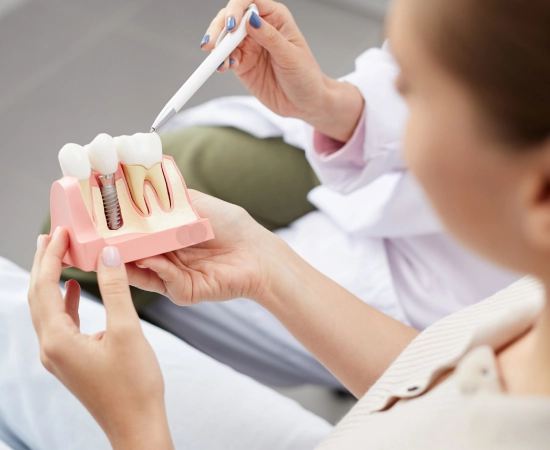A smile is an outfit that bestows confidence upon individuals, whether in social gatherings or conversations. However, the absence of a tooth can affect your smile and diminish your self-assurance. Individuals with missing teeth often search for the best tooth replacement options.
According to findings from The National Health and Nutrition Examination Survey (NHANES), over 90% of adults aged 20 to 64 experience tooth decay. The study further highlights the growing number of individuals with one or more missing teeth over time.
Fortunately, modern dentistry offers a range of options for replacing missing teeth. To provide you with comprehensive information, we’ve researched the available alternatives. Explore this blog to learn about the various options for replacing a missing tooth.

5 Best Tooth Replacement Options

Dental Implants
Dental implants are an excellent choice for many individuals due to their seamless integration with natural bone. In the procedure conducted by the skilled dentists at All About Smile Dental, implants are securely placed, effectively replacing the natural tooth root.
Advantages of Dental Implants
- Dental implants offer a robust and enduring solution for replacing missing teeth.
- With an appearance and functionality akin to natural teeth, they empower you to eat, speak, and smile confidently.
Drawbacks of Dental Implants
- While dental implants provide notable benefits, the procedure can be time-consuming, involving multiple appointments over several months.
- Implants may cost more than alternative tooth replacement options like dentures or bridges.
Dentures
Dentures are dental devices designed to fill the gaps left by missing teeth and the surrounding tissues. There are two primary types: complete dentures, designed to replace all teeth in either the upper or lower jaw, and partial dentures, created to address the absence of a limited number of teeth.
Advantages of Dentures
- Dentures offer a cost-effective solution for individuals in need of tooth replacement.
- The adaptable nature of dentures ensures a personalized and comfortable fit for each individual's mouth.
- Dentures provide flexibility in addressing the unique needs and preferences of the wearer.
Drawbacks of Dentures
- Dentures may require periodic adjustments or replacements due to natural changes in the mouth or wear and tear over time.
- Dentures can occasionally cause discomfort, leading to irritation or soreness in the gums and other soft tissues.
Dental Bridges
Dental bridges serve as prosthetic devices designed to span the gap resulting from the absence of one or more teeth. They comprise crowns fitted onto the neighboring natural teeth, known as abutment teeth, with a false tooth, or pontic, positioned in between.
Advantages of Dental Bridges
- Unlike some alternatives, dental bridges entail a non-surgical procedure for their placement.
- They effectively restore chewing functionality, allowing for improved bite and dental function.
- Dental bridges enhance aesthetic appearance, filling the gap and creating a seamless, natural-looking smile.
Drawbacks of Dental Bridges
- The installation of dental bridges necessitates the preparation of adjacent natural teeth to accommodate the crowns, which may involve some modification.
- While durable, dental bridges may require replacement over time due to wear and tear, necessitating periodic assessments and potential adjustments.
Dental Crowns
Advantages of Dental Crowns
- Dental crowns play a pivotal role in restoring a damaged tooth's appearance, strength, and functionality.
- Available in various materials, dental crowns can be color-matched to the surrounding teeth, ensuring a natural and harmonious look.
Drawbacks of Dental Crowns
- Obtaining a dental crown involves removing a portion of the natural tooth, potentially weakening it and increasing the risk of infection.
- Dental crowns can be expensive, and not all insurance plans cover the associated costs.
Implant Supported Bridges
Advantages of Implant-Supported Bridges
- Implant-supported bridges are securely anchored to dental implants, offering superior stability and preventing issues like slipping or shifting commonly associated with traditional bridges.
- The integration of dental implants stimulates the jawbone, helping to maintain its density and prevent bone loss over time.
- Implant-supported bridges closely mimic the appearance and function of natural teeth, providing a more realistic and comfortable experience for the patient.
Drawbacks of Implant-Supported Bridges
- The placement of dental implants involves a surgical procedure, which may require a healing period and additional appointments to complete the bridge.
- Implant-supported bridges tend to have a higher initial cost than traditional bridges, making them a more significant financial investment.
- The entire process, from implant placement to the finalization of the bridge, can take several months, requiring patience and commitment from the patient.
Conclusion
All About Smiles Dental is the preferred destination for addressing your missing tooth concerns. Dr. Marc Salah attentively listens to your needs and guides you in selecting the most suitable option from a diverse range of choices for tooth replacement.
You can schedule an appointment with our Roseville office by calling (586) 200-4187 and for the Canton office by calling at (734) 531-7638. Alternatively, you can also book your appointment online. Rest assured, our dedicated team will promptly contact you to assist with your dental needs.







